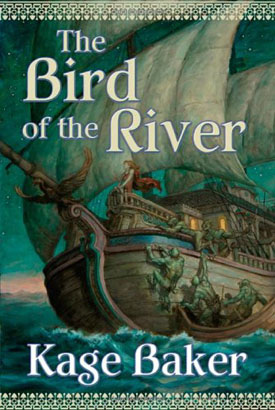 The late Kage Baker was one of those admirably unpredictable writers whose stories never seemed to fit into any sort of mold, whether they were part of a series or stood alone. There is, though, a kind of magic in her storytelling that ties them all together, fully in evidence in The Bird of the River, a novel set in the universe of The Anvil of the World.
The late Kage Baker was one of those admirably unpredictable writers whose stories never seemed to fit into any sort of mold, whether they were part of a series or stood alone. There is, though, a kind of magic in her storytelling that ties them all together, fully in evidence in The Bird of the River, a novel set in the universe of The Anvil of the World.
Eliss, her mother Falena, and half-breed brother Alder are wanderers, not by choice. Falena is a Diver, one of a highly regarded profession in a part of the world dominated by rivers and the sea. But Falena is not what she once was, due to drugs and a series of bad men. Badgered by Eliss, she finally finds work on The Bird of the River, a great barge that makes its journey up the navigable length of the river and back, carrying cargo and spotting snags and salvaging the lumber — cutting trees is pretty much out of the question because of the “Greenies,” the Yendri who live in the forests and worship the Mother, as opposed to the Children of the Sun, who worship the Father. The two races do get along, but not always very well; Alder’s father was a Yendri, which has led to a fair amount of difficulty for him in his short life.
On her first dive for the Bird, Falena is drowned when she becomes entangled in a headless, naked corpse wearing the golden armband of one of the great Families. The crew is joined shortly thereafter by Krelan, a scrawny youth who arrives precipitately after swimming across a small lake — someone just tried to kill him. He’s an assassin, as it happens, whose task is to find the head of that corpse — believed to be a scion of the Diamondcuts, a high Family that Krelan’s family has served for generations — and then find out who did it.
One of the chief delights in this book is the way that Baker allows the world to come to life slowly — another case of telling us what we need to know when we need to know it, and often not even telling us directly. Rather, she allows us to put the pieces together, keeping us engaged not only in the story, but in building the world the story happens in.
And the story itself is very well told. Baker has caught a nice balance between plot and revelation in this one. There’s the mystery of the headless corpse, which may somehow be connected to the bandit Shellback and his band of pirates and demons, who seem to be following the Bird on her upriver journey. This thread weaves itself into the story of the journey itself, building some continuous tension into what otherwise would be a classic odyssey. It becomes, instead, an odyssey with a plot.
And there is the story of revelation, centered largely on Eliss. Early on we’re given to understand that she is an active principle, a motivator for those around her — it’s through her insistence, after all, that Falena takes on the Diver job on the Bird. And after Falena’s death, Eliss has to deal not only with her guilt over that — Falena wasn’t really up to diving yet — but Alder’s increasing resentment and irritability at not belonging, and his deep need to find his father’s people. There is the irony of the ballad “Beautiful Falena,” composed by one of the musicians aboard after that lady’s drowning — and do keep in mind that the Bird is nothing so much as a floating village — and Eliss’ conflict over the picture of her mother in the ballad, which is everything Falena was not in real life.
And yet it’s not all conflict and guilt for Eliss. She proves to be a talented lookout, a necessary function in a river that changes course from season to season but is always full of snags, sandbars, and worse. And she proves to be a talented spy as well, aiding and abetting Krelan in his attempts to trace the course of his dead lord.
We see her grow from a fearful but determined girl to a young woman of wit, courage and intelligence, and it’s all done very subtly: Eliss’ realizations about new stages of her life are met on the reader’s part with “Yes, I knew that” — after a moment of reflection and our own realization that yes, we did know it — or should have.
Let there be no doubt that the other characters fare as well in Baker’s hands. It’s all of a piece, a carefully, solidly constructed story that leads us into a fascinating world populated by an equally captivating group of people, giving us what we need to know and yet managing to surprise us from time to time.
Can’t hardly do better than that.
(Tor Books, 2010)
